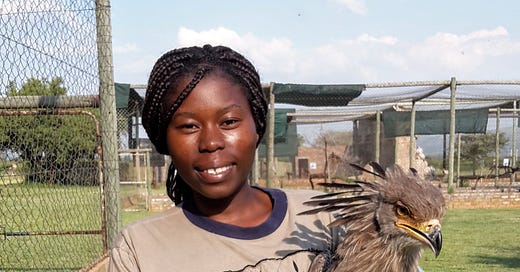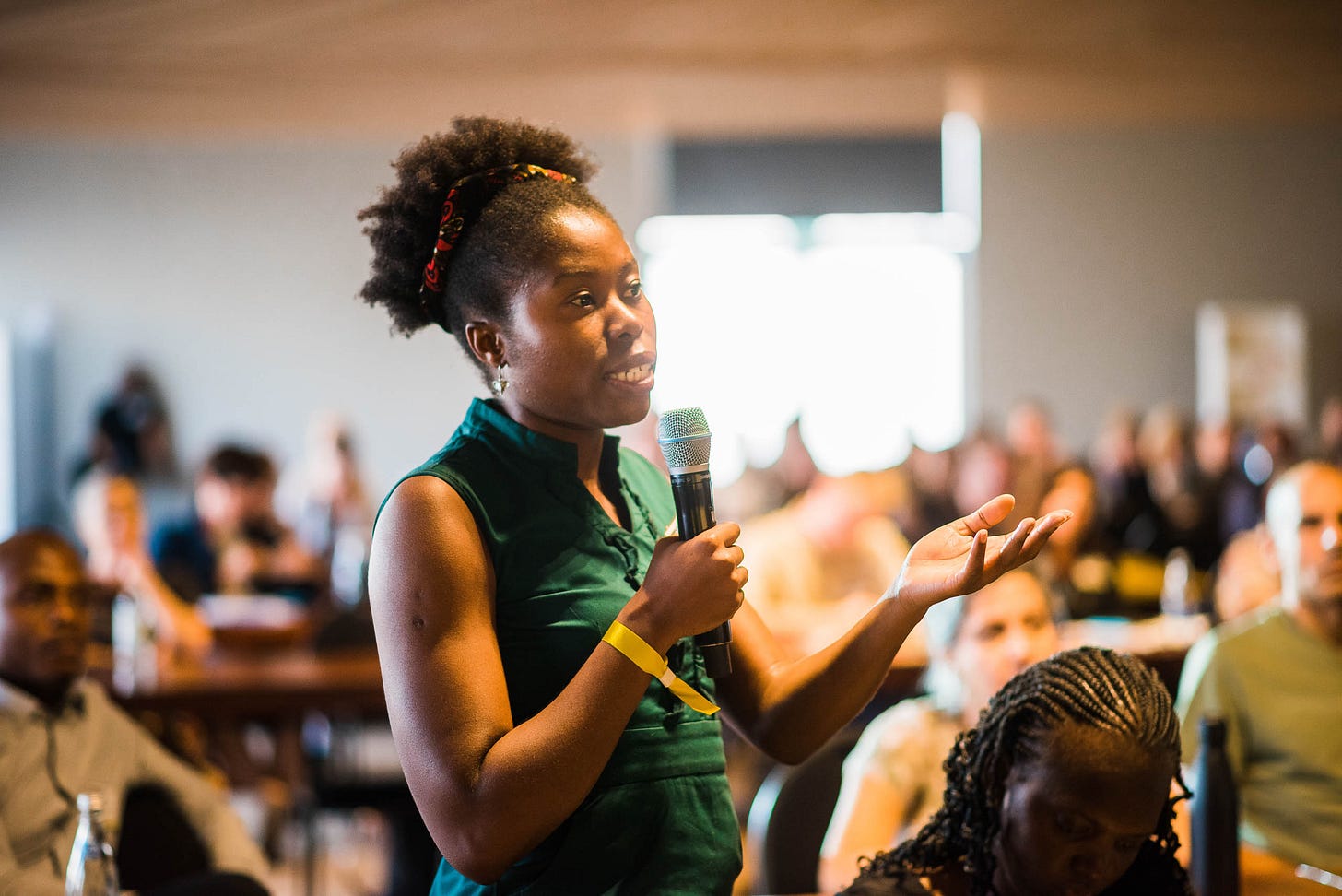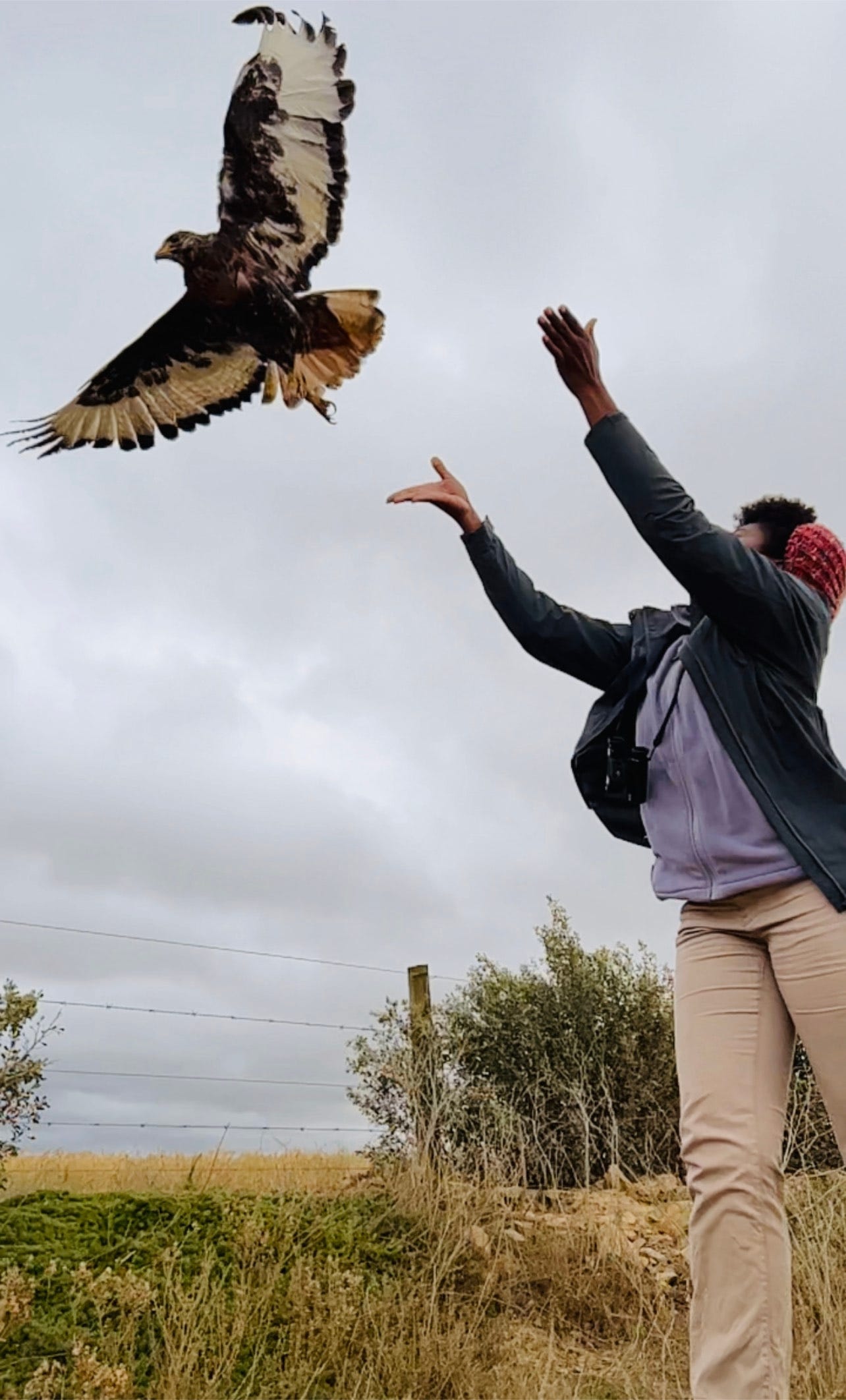I met this month’s guest, Merlyn Nomusa Nkomo at Hawk Mountain Sanctuary when her recent visit overlapped with one of my programs. Merlyn’s passion, energy, and enthusiasm captured my attention immediately, and we soon found ourselves deep in a conversation that I wish had lasted for many hours longer. I came away with tremendous respect for her work, as well as her dedication to the importance of sharing what she learns with others.
Hawk Mountain is celebrating its 90th anniversary as the world’s first refuge for birds of prey this year, and the International Trainee Program that Merlyn participated in has been in place for 35 of those years. This immersive program brings young people from all over the world to the sanctuary to receive professional field training, learn data collection methods, participate in seminars, and more. It’s just one of the many ways Hawk Mountain Sanctuary unites people—and science. I’m so thankful it brought Merlyn and I together!
Interview: Merlyn Nomusa Nkomo
Welcome to Twig & Ink! Could you tell us a little bit about yourself?
I am Merlyn Nomusa Nkomo (Nomsa). I am a PhD Candidate at the University of Cape Town in South Africa. I am studying for a doctorate in conservation biology. I am an ornithologist with a special focus in raptor biology.
What aspect of your work are you most excited about?
I am most excited about the parts of my work that involve sharing and creating space for more people in ornithology, conservation, and overall, science. I also love interdisciplinary spaces and exploring the intersection of different disciplines, especially the arts, history, and culture with science. I love reconnecting people and society with science, especially the kind of science that improves our relationships with each other, ourselves, and the environment.
How are science, art, and writing part of your work, and how is the interaction between these areas important to you?
For me personally, I don’t view them as separate. My knowledge of scientific concepts, research and experimental techniques, and surveys are in a sense what a historian, philosopher, or journalist would view as their way of reaching truth or knowledge. Sharing that knowledge in writing or thinking broadly on its applications in society beyond the silos of science or the proverbial knowledge gap is, to me, art and creativity. Altogether, this process is storytelling: creating or discovering a narrative, a purpose, a problem, a quest around the work of science and elevating its applications to levels at which everyday people cannot avoid its salience and importance for their lives. This is important to me in my work.
Is there a particular environmental problem that feels important to you? What do you do about that?
Earlier in my career journey, single environmental and conservation issues were problems I fixated on and endeavored to right. Issues such as the conservation of Old World Vultures, for example (learn more here and here).
However, the more I workshopped ideas for my contributions to change, the more I realized the interdisciplinary nature of the problems, and that their roots are apathy and separation from nature. I shifted my focus to create opportunities, spaces, and ways for people—particularly young Africans—to learn about and connect with nature. They have been disenfranchised from it the most, at least where I am from.
How does your identity, position, and perspective affect your work?
I never used to think of my identity as a woman, a young person, and a Black one for that matter, as anything. As a matter of fact, I never used to think of my identity at all. This was a blessing, as it affirmed my beliefs and belonging in the spaces of science and conservation way before I woke up to the systemic reasons why I was a minority in this field.
Now, I find myself well positioned to inspire others to aspire to careers in conservation, leadership, and to pursue their own niche interests in science. My experiences are unique, but they have placed me well to be a bridge between communities that seldom interact and engage on a human experience level, the level that affects everything we decide is possible for people like ourselves anyway. Finally, I feel like my identity positions me well to bridge the relational gap between science and the African communities it serves in our context.
Who or what influences and inspires you?
My younger self. When I look back to myself as a child, a teenager, and much earlier in my career, I see someone who was very strong and determined and yet did not know it.
I grew up without a lot of icons to look up to for what I wanted from life. All the inspirational figures most people are inspired by are people I got to know about intimately, and I felt affirmed by their life stories later in my life when I had passed the hardships that were meant to thwart my will to push on in mine. Younger me pressed on to come first in class, or to make it to university or Hawk Mountain Sanctuary, purely because she loved what she did and believed that doing one’s honest part every day was the only way to approach life. I’m inspired by that fearlessness, audacity, and passion every time I feel bogged down or inadequate.
Are you interested in collaborating with other groups or individuals on science-art-writing projects? If so, what sorts of collaboration are you interested in, and what are you most excited to share?
I’m certainly interested in collaborating with artists, illustrators, designers, and also people in the conservation education space. I lead a youth initiative called the Matabeleland Youth Conservation Society and we are in need of support to carry through, evolve, and scale our programs.
I myself as a creative would like to continue growing and expanding ways in which I share my poetry, storytelling, and science communication, and I am keen and excited to collaborate on projects, particularly ones with a focus on raptors, birds, youth and women, mental health, and conservation in Africa.
Could you tell me more about Matabeleland Youth Conservation Society? How does it relate to the intersection of science, art, and writing?
Our youth conservation society has four pillars of programming: conservation and research, education and outreach, social enterprise, and arts and culture. Our mission is to be an organization that mines the interface of these topics in the biodiversity economy for the benefit of young people.
Arts and culture are particularly important to me, as I want them to be an avenue for mainstreaming conservation into the social fabric and movements of African youth. I also want it to be the way in which we usher in a renaissance in appreciating and embracing the past ways of our ancestors who were, in their very way of life, at one with nature and who bring indigenous knowledge to life.
Through these pillars, I’d like to mentor young people to express themselves and their passion for conservation in varied ways, such as writing, poetry, film, and other mediums, and additionally, to help them find ways of profiting and making a living from their skills and talents.
I’d love to hear more about your own artistic practice.
I am exploring the wildlife filmmaking space to use that form of visual media for my storytelling. I have always used photography, albeit not much recently, as a visual science communication tool. I share many of my field and travel experiences on social media, and I want that space to be a balance of brilliant photos and functional and educational photos. Unfortunately, I currently have a lot to juggle, and my art often falls by the wayside. I hope that once this season (PhD) of my life wraps up, I can have time to dive back into my creative self and even back to sketching and charcoal. There's just so much I want to express in different art forms alongside my writing and poems.
What other organizations have helped and supported you?
I am part of several communities that have mentored me as a scientist, leader, and storyteller: Hawk Mountain Sanctuary, a global leader in raptor conservation science that creates, conducts, and coordinates integrated research worldwide; The Mandela Rhodes Foundation, a foundation offering scholarships to exceptional young Africans to build their capacity as Pan-African leaders of various disciplines; and NEWF Community, a filmmaking organization that mentors African conservation storytellers of all kinds, including scientists, photographers, filmmakers, musicians, and more, to equip them to refocus the narrative on African conservation stories. These communities are global, and all have a transformative aim to build a better world and a better Africa.
I have also been supported and generously funded for my PhD by the Shannon Elizabeth Foundation. Through my PhD journey, they have supported me in not only my academic work but also my conservation leadership work, mentoring me through editing my opinion piece articles and through the work they do with their podcast, The Art of Conservation.
If you could live your life over again, would you do anything differently? (from Dr. Aaron M. Ellison, 018)
If I had a second chance in life I would certainly learn and take part in more sports. My fear of failure or losing kept me from participating in sports and a lot of other competitive activities. Other than growing from those feelings, I would like to get the value of fitness, team spirit, and recharging from physical exercise the way sports offer for many.
Do you have a formative experience from growing up that you feel was your 'spark' to lead to you where you are now? (From Jenn Houle, 006)
When I was about eight or nine years old, my father took us to visit a wildlife orphanage outside our city. By then I already loved the outdoors and took every chance I could to play in or explore the outskirts of the township I grew up in. However, on this particular day I was heartbroken to learn that a rhino I was excited to see at this orphanage had been killed by poachers the previous night. This was my first negative interaction with humans’ impact on wildlife, and certainly the first time I realized that more than loving and enjoying nature, we needed to protect it from ourselves and the harm we cause.
Have you ever felt “alone in a world of wounds”? Have you ever wanted never to revisit a wilderness? How have you grappled with these feelings and the realities of change in wild spaces? (from Maia Buschman, 019)
I think change is a constant and the first thing I have accepted is that it is inevitable. What I do for the environment and other spaces I value (and would like to see stay the same or protected from distractive change) is to enjoy them while they are there and invite and inspire others to do the same. That radical use, communion, and enjoyment of these wild spaces sparks love, appreciation, and respect when people have encounters with nature that they know they could never replicate elsewhere if they were to lose it. In so doing, the radical joy and showing this space in a positive light could change human behavior.
Who do you hope to reach with your work?
I think the world has a relational problem and often we narrow down and become hyper-focused on who we aim to speak to. We diminish the in-between spaces where people of different lifestyles, backgrounds, and motivations can learn from each other and shift, grow, and change. I hope to reach anyone who is willing to listen, watch, and read what I put out into the world and give them a chance to decide how relevant it is—or can be—to them in this, our big, interconnected, collective world.
Do you have a memorable experience that has solidified your belief in the value of the work that you do? (from Shirlene Chiam, 012)
As an ornithologist, every time I’ve taught someone, especially a child, how to use binoculars and see a bird for the first time. The wonder and awe that comes next as a reaction solidifies the value and beauty of what I do and why I love it with everything I am.
Thank you so much, Merlyn! If you’d like to learn more about Merlyn and her work, you can find her online:
Linktree: https://linktr.ee/merynomsa
@merynomsa (Twitter and Instagram)
Merlyn Nomusa Nkomo (LinkedIn and Facebook)
@wanderin_n_wondering (Instagram wildlife & fieldwork)
You can also follow the Matabeleland Youth Conservation Society on Facebook and Instagram.









Spot on with the need for interdisciplinary solutions to complex problems!
Great interview! South Africa needs more young conservationists.